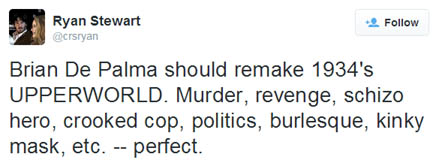
 Hello and welcome to the unofficial Brian De Palma website. Here is the latest news: |
|---|
E-mail
Geoffsongs@aol.com
-------------
Recent Headlines
a la Mod:
Listen to
Donaggio's full score
for Domino online
De Palma/Lehman
rapport at work
in Snakes
De Palma/Lehman
next novel is Terry
De Palma developing
Catch And Kill,
"a horror movie
based on real things
that have happened
in the news"
Supercut video
of De Palma's films
edited by Carl Rodrigue
Washington Post
review of Keesey book
-------------
Exclusive Passion
Interviews:
Brian De Palma
Karoline Herfurth
Leila Rozario
------------
------------
| « | September 2015 | » | ||||
| S | M | T | W | T | F | S |
| 1 | 2 | 3 | 4 | 5 | ||
| 6 | 7 | 8 | 9 | 10 | 11 | 12 |
| 13 | 14 | 15 | 16 | 17 | 18 | 19 |
| 20 | 21 | 22 | 23 | 24 | 25 | 26 |
| 27 | 28 | 29 | 30 | |||
De Palma interviewed
in Paris 2002
De Palma discusses
The Black Dahlia 2006

Enthusiasms...
Alfred Hitchcock
The Master Of Suspense
Sergio Leone
and the Infield
Fly Rule
The Filmmaker Who
Came In From The Cold
Jim Emerson on
Greetings & Hi, Mom!
Scarface: Make Way
For The Bad Guy
Deborah Shelton
Official Web Site
Welcome to the
Offices of Death Records
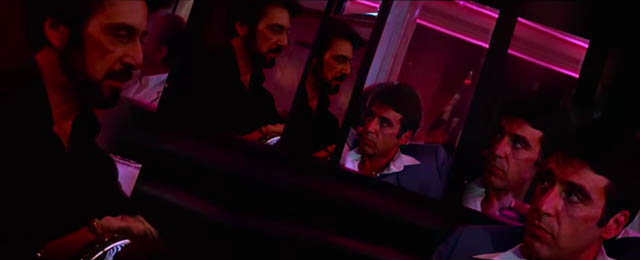
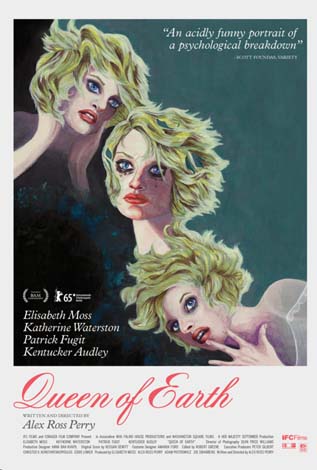 This past February, after Queen Of Earth screened at the Berlin Film Festival, we noted some links between Alex Ross Perry and Brian De Palma. As Queen Of Earth makes its way through U.S. theaters (and also currently available on demand), here are some links from the past week:
This past February, after Queen Of Earth screened at the Berlin Film Festival, we noted some links between Alex Ross Perry and Brian De Palma. As Queen Of Earth makes its way through U.S. theaters (and also currently available on demand), here are some links from the past week:Stephanie Zacharek, The Village Voice
"There's a lot going on in this modestly scaled movie: It's a meditation on the rickety foundations on which even close friendships can be built, and on the notion of whether or not nature — even with all its soothing sounds and comforting greenery — is really our ally. It's also a teasing admonition that we shouldn't believe everything we see, as well as a stylish, whispery love letter to psychological horror studies like Repulsion, Persona, and possibly Brian De Palma's Sisters."
Ignatiy Vishnevetsky, A.V. Club
"In Queen of Earth, writer-director Alex Ross Perry—who does snippy black comedy better than just about anyone else on the current American indie landscape—dials down the humor that has defined his work to this point, and turns up the queasy psychological currents that have always gurgled underneath it. Walking a fine line between pastiche (think early Roman Polanski and Persona-era Ingmar Bergman crossed with the opening scenes of a backwoods grindhouse flick) and bona fide psychodrama, Queen Of Earth works much of the same subject matter—egoism, self-destruction, mutual loathing—as Perry’s earlier films; in fact, it’s not hard to think of it as a companion piece to last year’s superb Listen Up Philip, and not just because the two movies appear to share a fictional universe.
"And yet, there is an innate, affecting strangeness to Queen Of Earth, which is pitched somewhere halfway between actor’s showcase and creepy formal exercise, continually foreshadowing a burst of psychotic violence that never comes...
"Like all of Perry’s prior features, Queen Of Earth was shot on 16mm, though here he and his longtime cinematographer, Sean Price Williams, go for a slightly different, trickier formal palette. Both the director’s little-seen debut, Impolex, and his breakthrough feature, The Color Wheel, climaxed with talky, nearly-10-minute long takes that stuck the audience straight into the characters’ emotional trauma; here, he pulls one together early on, structured as a series of eerily intimate close-ups in which the slowly panning camera draws the viewer into Catherine and Ginny’s characters while establishing the connection (or lack thereof) between them. Brian De Palma-style split diopter shots—in which both foreground and background are in focus, separated by a fuzzy middle—recur, making for an effective visual metaphor for the central relationship."
Matthew Jacobs, Huffington Post
"Told in the vein of the classic genre that Perry describes as 'psychotic-women cinema' -- think Whatever Happened to Baby Jane? and Brian De Palma's Sisters with a touch of Rosemary's Baby and Woody Allen's Interiors -- Queen of Earth is an eerie look at the claustrophobia that sets in when childhood fixtures become relics."
Also note that for its cover story on Mistress America, the July/August 2015 issue of Film Comment includes an interview with Noah Baumbach conducted by Alex Ross Perry.
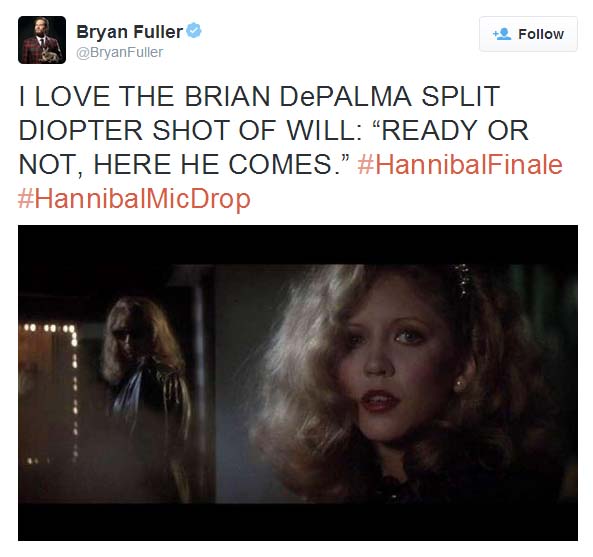
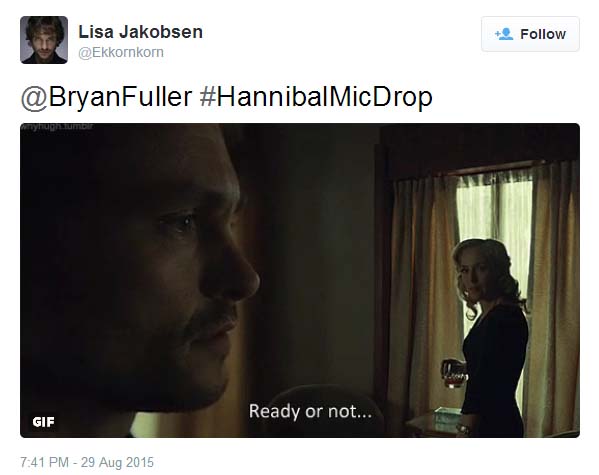
One Way Or De Palma from Joe Ahearne on Vimeo.
Rob Dean at A.V. Club asked Joe Ahearne about the creation of the excellent video he posted on Vimeo recently, One Way Or De Palma, in which he masterfully edited images from the films of Brian De Palma, setting them to a soundtrack of Blondie's One Way Or Another. Here is what Ahearne had to say to Dean:
I saw my first De Palma film when I was 17—Dressed To Kill—and that film taught me what it was a director does. It was only on repeated viewings that I realised what was happening with the slow motion (so gripped was I, I didn’t even realise the film had slowed down), the music, the colour, the editing, the framing, the camera moves, the story-telling (later on of course I realised what a superb director of actors he was too). And I hunted down all his films before and since (almost—haven’t seen Get To Know Your Rabbit yet!). I grew up on spectacle like Star Wars but De Palma showed me how a director could invest human scale drama with even more extraordinary emotion and intensity. Anyone who’s seen any of the stuff I’ve done who loves De Palma will easily spot the influences.For a long time I’ve wanted to use De Palma’s images against Blondie’s “One Way or Another.” They share a certain obsessive quality. It was so great viewing De Palma’s last 22 films and appreciating him like a great composer, enjoying the reworking and recapitulation and reframing of themes - hearing his voice, I suppose. What really came home to me this time (I’ve seen them all many times) was what a master of colour he is. I tried to reflect that in the cut.
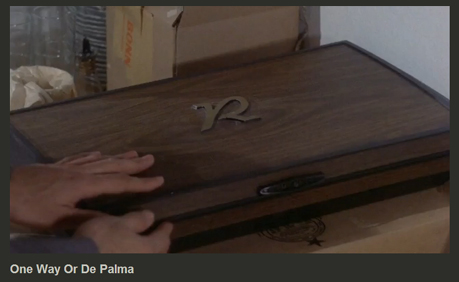 Joe Ahearne, the writer/director whose Trance was recently made into an excellent feature film directed by Danny Boyle, edited together an amazing supercut of shots from Brian De Palma films set to Blondie's One Way Or Another. Titled One Way Or De Palma, the video was put together with great revelatory skill by someone who obviously knows these movies very well. This has to be the best "megamix" of De Palma's films I've seen yet-- it's a stunner, done with superb care and wit. Below is the tweet from Edgar Wright that brought my attention to the video (I cannot embed the video, so you'll have to watch it on Vimeo, where you can also download it).
Joe Ahearne, the writer/director whose Trance was recently made into an excellent feature film directed by Danny Boyle, edited together an amazing supercut of shots from Brian De Palma films set to Blondie's One Way Or Another. Titled One Way Or De Palma, the video was put together with great revelatory skill by someone who obviously knows these movies very well. This has to be the best "megamix" of De Palma's films I've seen yet-- it's a stunner, done with superb care and wit. Below is the tweet from Edgar Wright that brought my attention to the video (I cannot embed the video, so you'll have to watch it on Vimeo, where you can also download it).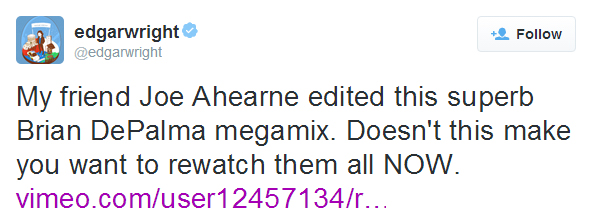
 Italian TV channel Studio Universal will present a tribute to Brian De Palma to mark his 75th birthday on September 11, 2015, according to TV Numeriuno. The Cinechat, which has already been recorded (with De Palma sitting in the yellow chair seen here), will be followed by a showing of De Palma's Casualties Of War. The TV Numeriuno article/press release includes several quotes from De Palma, pulled from the Cinechat:
Italian TV channel Studio Universal will present a tribute to Brian De Palma to mark his 75th birthday on September 11, 2015, according to TV Numeriuno. The Cinechat, which has already been recorded (with De Palma sitting in the yellow chair seen here), will be followed by a showing of De Palma's Casualties Of War. The TV Numeriuno article/press release includes several quotes from De Palma, pulled from the Cinechat:"When I returned to Italy I was in college. I arrived in Rome with two friends and I bought a Lambretta. I will never forget the tours I made by Vittorio Emanuele... then I took a car and drove from Venice all the way to Paris. During the trip I saw the beautiful cities of Siena, Perugia, Florence with a sensation of how much beauty there is in this country."
"My experiences and my feelings are part of my films and the Italian cinema affected me very much. I remember Rossellini, Anna Magnani, and also the way in which Antonioni visually conceptualized his ideas. I will never forget movies like L’Avventura or Red Desert."
"In my opinion the best American film about Italy is The Godfather, and not because we talk about mafia, but because it tells us that the family is an integral part of Italian culture."